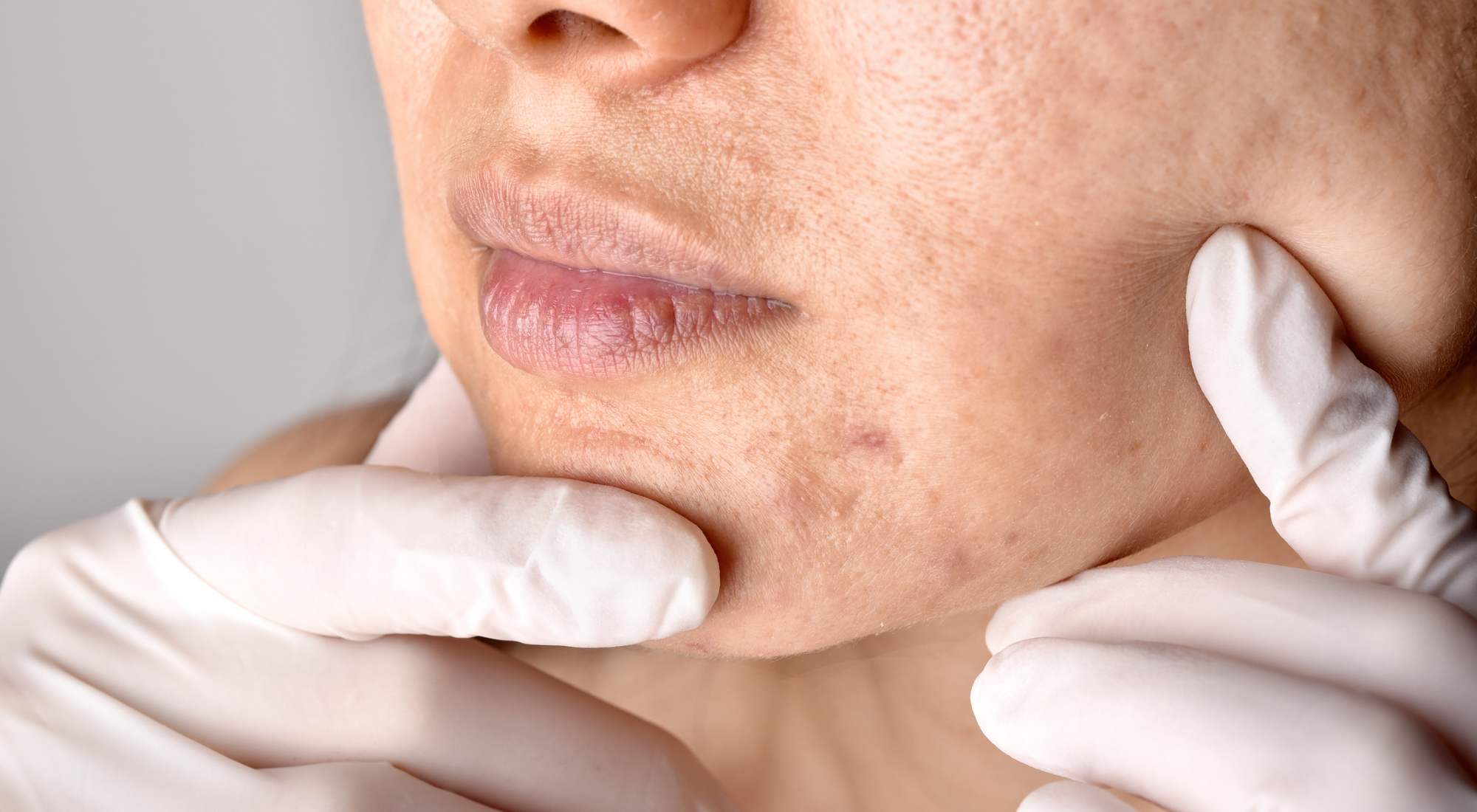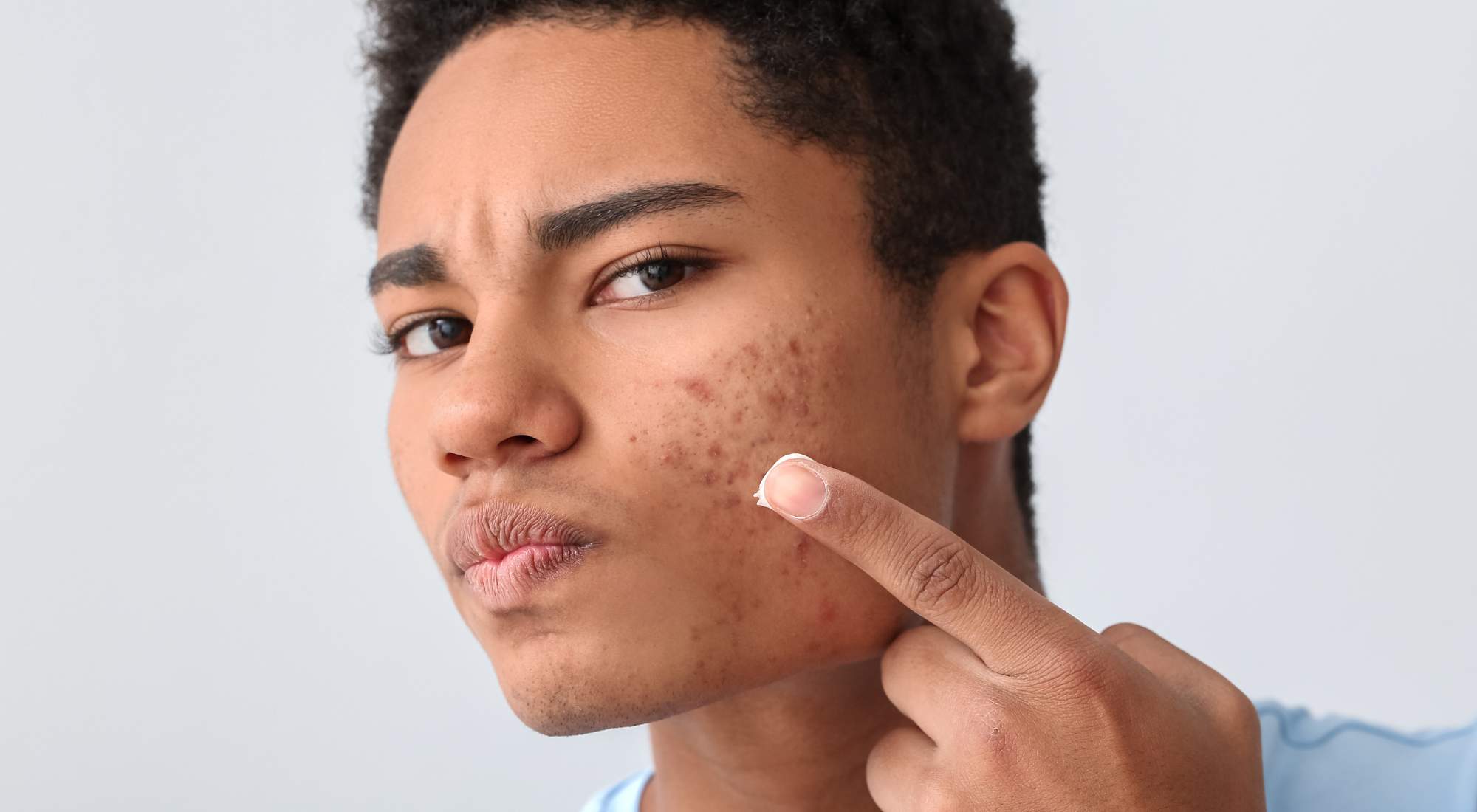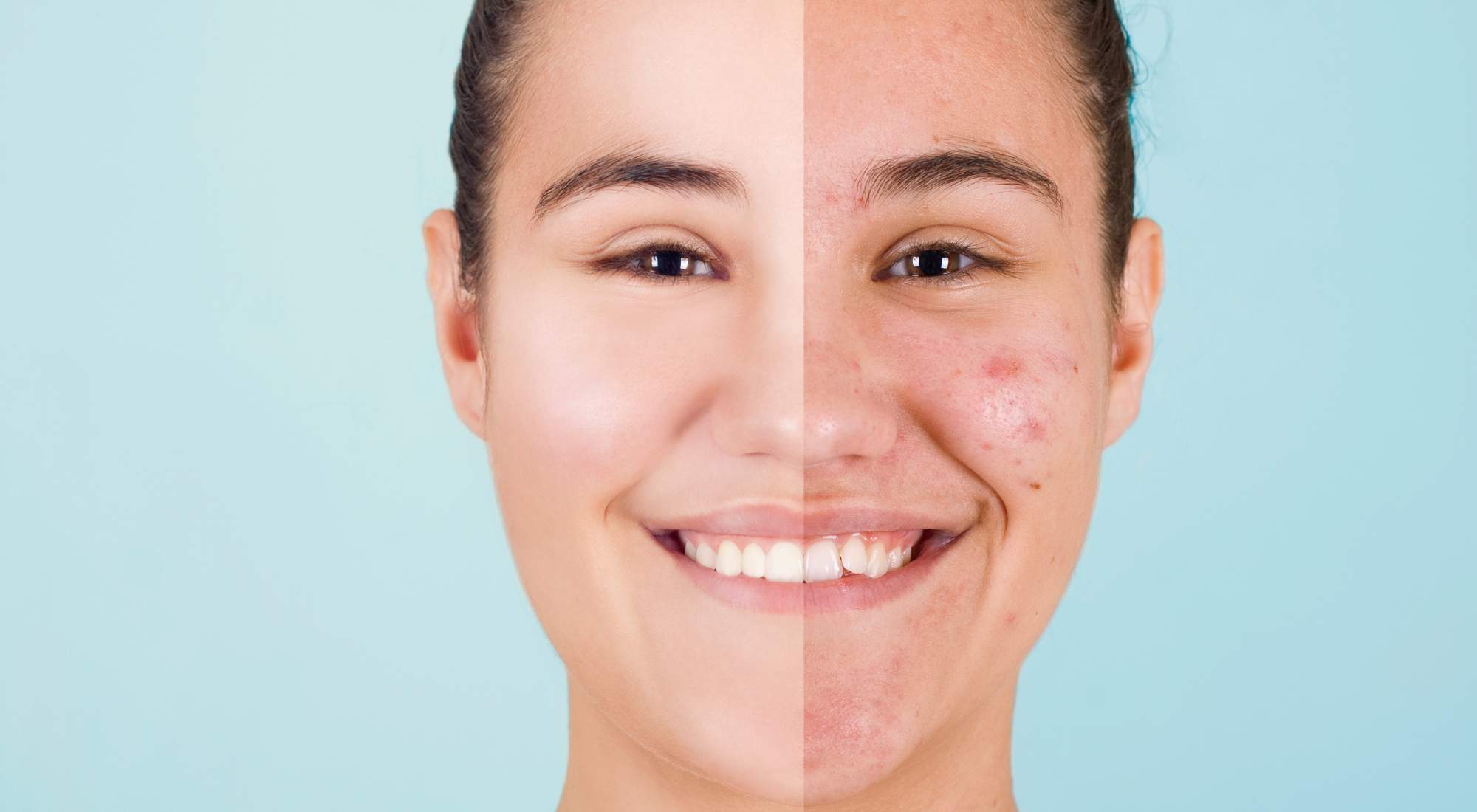Symptoms, Diagnosis, and Treatment for Acne
For many people, acne is a fact of life. Clogged pores, bumps, and cysts can cause painful and even embarrassing experiences.
But this isn’t something you have to endure.
With the right comprehensive dermatology clinic on your side, your acne symptoms can be improved and perhaps even eliminated.
We’ll explain what acne is, what causes it, and how it can be treated — including preventative measures you can take at home to try to get the clear skin of your dreams.
Table of Contents

What Is Acne?
Acne is a common condition affecting almost 10% of the global population and up to 50 million Americans each year. It is often experienced between the ages of 12 and 24, with around 85% of people in this age bracket reporting they have at least minor acne. This is mostly due to the hormonal changes that occur during puberty.
But acne isn’t limited to the “teen years” and can occur at any age. Many people experience it well into their 30s and 40s, but it does tend to grow less common after that.
This skin condition includes bumps on the skin such as pimples, whiteheads, and blackheads. They can occur anywhere on the body but are most commonly found on the face, neck, shoulders, chest, and back.
With severe acne, cysts and nodules can form under the skin. This may result in scarring, which can become permanent if left untreated.
What Are the Risk Factors for Acne?
It can be frustrating to see that some people don’t have to deal with acne much at all while it’s a constant headache for others. We don’t know for sure why this happens.
Besides the increased androgen hormones of adolescence, there are other things associated with the presence of acne, such as:
- Diet – Some studies have shown that both a high-glycemic diet (consisting of foods that cause blood sugar to spike quickly) and increased dairy consumption can exacerbate acne.
- Genetic factors – If you have a family history of acne, you’re more likely to develop it.
- Certain medications – Specifically, anabolic steroids and corticosteroids may trigger acne.
- Stress – Emotional strain may make acne worse.
- Endocrine disorders – Conditions such as PCOS and congenital adrenal hyperplasia can cause androgen levels to rise, increasing the likelihood of acne forming.
Improper skin care can also lead to increased acne. Especially if you already have acne-prone skin, you should use makeup, moisturizers, and sunscreens that won’t clog your pores (labeled non-comedogenic).
What Are the Symptoms of Acne?
Someone with acne may experience symptoms like:
- Inflamed, raised bumps (with or without pus)
- Tiny, dark bumps (blackheads)
- Tiny, white bumps (whiteheads)
- Bumps that form under the skin (cysts or nodules)
- Scarring (pits, raised marks, or indentations)
- Post-inflammatory hyperpigmentation (dark spots that stay on the skin for weeks or months after lesions heal)
Patients with acne may experience any combination of the above symptoms, which can also be accompanied by tenderness and pain.
Not only may acne affect your appearance, but it can also lead to social and psychological challenges for some people.
What Causes Acne?
Acne is caused when excess oil and skin debris create pore blockages known as comedones. These clogged pores can form whiteheads and blackheads.
Sebum, the oily substance made by the sebaceous glands in your skin, and bacteria build up behind the comedones and create red, raised bumps that most people call pimples.
In more severe acne cases, these blockages can cause cysts or nodules to form deep within the skin’s layers. These may be characterized by extremely red, inflamed, and sometimes painful lumps.
How Is Acne Diagnosed?
Acne is diagnosed based on several different factors.
Mild acne — also known as comedonal acne — is usually accompanied by comedones (blackheads and whiteheads) and a limited number of pimples.
Moderate acne — also known as pustular or non-scarring inflammatory acne — patients often have comedones along with a larger number of pimples than those with mild acne. There may be only a few (or no) nodules present.
Severe acne — also known as cystic, scarring, or nodulocystic acne — is accompanied by large numbers of comedones, pimples, nodules, and/or cysts. Scarring often occurs with this category of acne.

How Is Acne Treated?
With the right treatment, acne can be controlled and your skin can look and feel great again. At Goodskin Dermatology, we understand that every patient is different due to the many different factors involved in acne treatment.
We believe there is a way to successfully treat almost every patient. At your first appointment, we will evaluate your skin and classify the severity of your acne. Then we’ll take your patient history and past treatments into account to create an effective treatment course.
As treatment continues, we will schedule follow-up appointments so we can monitor your progress and adjust treatments as necessary.
Please note that treatments may vary depending on the individual patient and the severity of acne. Always consult with your healthcare provider to see which treatment is recommended for you.
4 Categories of the Most Common and Effective Acne Treatments
When treating acne, we often use a combination of methods to help address the specific causes while testing the patient’s tolerance to medications. Here are some of the treatments we find most effective.
#1: Topical Medications
Some of the most popular topical medications used in the treatment for acne include:
- Topical antibiotics – Antibiotic creams or ointments work by reducing inflammation/redness and killing excess bacteria. These formulas are usually combined with benzoyl peroxide to lessen the occurrence of antibiotic resistance. Topical antibiotics are often used in combination with retinoids.
- Retinoids/retinoid-like drugs – Helpful for moderate acne, these creams, gels, and lotions contain retinoic acids or tretinoin. Topical retinoids work by preventing pores from getting clogged. They are known to increase sun sensitivity and may cause redness and dryness, especially for those with darker skin tones.
- Salicylic acid – This treatment helps prevent clogged pores and can be used as a wash-off or leave-on product. It may cause minor skin irritation and discoloration.
- Azelaic acid – This naturally occurring, yeast-produced acid has antibacterial properties. The prescription versions such as Azelex and Finacea can be used by women during pregnancy and breastfeeding. This topical medication not only treats acne but can also help manage skin discoloration. It may cause minor skin irritation and discoloration.
- Dapsone – This gel is a helpful treatment for inflammatory acne, especially in women. It is known to cause redness and minor skin irritation.
#2: Oral Medications
In our experience, these oral medications can be effective acne treatments:
- Antibiotics – Oral antibiotics may be necessary with moderate to severe acne to help reduce bacteria. To prevent antibiotic resistance, these should be used for as short a time as possible and be combined with other drugs like benzoyl peroxide. Oral antibiotics tend to increase sensitivity to the sun.
- Anti-androgen agents – These block the effects of androgen hormones on glands that produce oil. They may be used on women or adolescent girls if oral antibiotics don’t do the trick. Anti-androgen agents can cause painful periods and breast tenderness.
- Combined oral contraceptives – Birth control pills that combine progestin and estrogen have been shown to improve acne symptoms within a few months. Oral contraceptives have been known to cause side effects such as weight gain, nausea, and breast tenderness. They also may lead to an increased risk of breast and cervical cancers and cardiovascular issues.
- Isotretinoin – This oral medication is derived from vitamin A and may help those who have moderate to severe acne that hasn’t responded to other treatments. This drug has the possibility of severe side effects such as IBS, depression, and severe birth defects. Patients who use it must see their doctors regularly to monitor for these side effects and enroll in an FDA-approved risk management program.
#3: Therapies
These therapies may help with acne and its effects, either in combination with other medications or alone:
- Drainage and extraction – Your dermatologist has special tools to gently remove comedones or cysts that haven’t cleared up after using medication. This improves the skin’s appearance but does come with a risk of scarring.
- Chemical peels – These procedures involve repeated applications of a solution such as salicylic, retinoic, or glycolic acids. This can improve the skin’s appearance for patients with mild acne, but repeat treatments are needed to maintain its effects.
- Light therapy – Light-based therapies can help the skin by killing bacteria and reducing oil production. This regimen requires multiple visits.
- Steroid injection – Cystic and nodular lesions that accompany severe acne can be treated by injecting steroidal drugs into them. This usually results in decreased pain and causes the bumps to shrink rapidly. Side effects may include skin discoloration and thinning in treated areas.
#4: Skin Care Education
At Goodskin Dermatology, we don’t just treat your acne. We also educate you on how to help decrease or eliminate it with things you can do at home. Here are some of our best tips for achieving clear skin:
- Practice proper skin care – Wash your face twice a day with a dermatologist-approved, gentle cleanser to remove excess makeup, dirt, and oil. Cleansers with benzoyl peroxide and salicylic acid are made to fight acne and can help with treatment and prevention.
- Pick the right makeup – To avoid clogging your pores, look for brands labeled oil-free or non-comedogenic. Take off all your makeup every night and don’t forget to moisturize afterward!
- Don’t pick or pop – We know it’s tempting, but you must resist the urge to pick at your skin or pop pimples. This can not only lead to scarring but can also spread bacteria from your pores and make your acne worse.
- Have patience – Your acne isn’t going to clear up overnight, and it may sometimes get worse before it gets better. Give your treatment the proper amount of time to work (several weeks or even months) before giving up or trying something different. We will monitor your progress and advise you as needed along the way.

Goodskin Dermatology Provides High-Quality, Patient-Based Care for Your Acne Issues
At Goodskin Dermatology, treating acne is one of our specialties. We understand the importance of healthy skin and the impact it has on your appearance and emotional health, so we’ll do everything we can to help you look your best.
We strive to give each patient the highest quality clinical, cosmetic, and surgical skin care based on their individual issues and desires. Our use of the latest dermatological technologies helps ensure our patients receive effective treatments with outstanding results.
If you need acne treatment or have any other dermatology needs, you can trust our Portland-area practice to give you excellent, individualized care that will help keep your skin looking its best.
Schedule an appointment online today with Goodskin Dermatology.
The content in this blog should not be used in place of direct medical advice/treatment and is solely for informational purposes.

